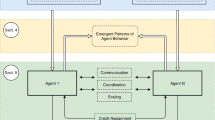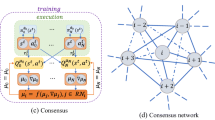Abstract
The reinforcement learning is used to study the problem of multi-agent pursuit-evasion games in this article. The main problem of current reinforcement learning applied to multi-agents is the low learning efficiency of agents. To solve this problem, a credit allocation mechanism is adopted in the Multi-agent Deep Deterministic Policy Gradient frame (hereinafter referred to as the MADDPG), the core idea of which is to enable individuals who contribute more to the group to occupy a higher degree of dominance in subsequent training iterations. An event-triggered mechanism is utilized for the simplification of calculation. An observer is set for the feedback value, and the credit allocation algorithm is activated only when the observer believes that the agent group is in a local optimal training dilemma. The final simulation and experiment show that, In most cases, the event-triggered multiagent credit allocation algorithm (hereinafter referred to as the EDMCA algorithm) obtained better results and discussed the parameter settings of the observer.






Similar content being viewed by others
References
Mnih V, Kavukcuoglu K, Silver D et al. (2015) Human-level control through deep reinforcement learning. Nature 518:529–533.
Ferber J, Weiss G (1999) Multi-agent systems: an introduction to distributed artificial intelligence. Reading, Addison-Wesley.
Mordatch I, Abbeel P (2017) Emergence of grounded compositional language in multi-agent populations. arXiv:1703.04908
Singh S, Cohn D (1998) How to dynamically merge markov decision processes. Adv Neural Inf Process Syst 10:1057–1063.
Tan M (1993) Multi-agent reinforcement learning: Independent vs. cooperative agents. Proceedings of the tenth international conference on machine learning 330–337
Dayan P, Hinton GE (1993) Feudal reinforcement learning. Advances in neural information processing systems 271–278
Vinyals O, Babuschkin I, Czarnecki WM et al. (2019) Grandmaster level in StarCraft II using multi-agent reinforcement learning. Nature 575:350–354.
Littman ML (1994) Markov games as a framework for multi-agent reinforcement learning. Machine Learning Proceedings 1994:157–163.
Sprague N, Ballard D (2003) Multiple-goal reinforcement learning with modular sarsa(0)
Tesauro G (2004) Extending Q-learning to general adaptive multi-agent systems. Advances in neural information processing systems 16:871–878.
Lowe R, Wu Y, Tamar A, Harb J, Abbeel P, Mordatch I (2017) Multi-agent actor-critic for mixed cooperative-competitive environments. Advances in neural information processing systems 30:6379–6390.
Foerster JN, Farquhar G, Afouras T, Nardelli N, Whiteson S (2018) Counterfactual multi-agent policy gradients. Proceedings of the AAAI Conference on Artificial Intelligence 32:2974–2982.
Wang YW, Lei Y, Bian T, Guan ZH (2019) Distributed control of nonlinear multiagent systems with unknown and nonidentical control directions via event-triggered communication. IEEE Transactions on Cybernetics 50:1820–1832.
Guan ZH, Hu B, Chi M, He DX, Cheng XM (2014) Guaranteed performance consensus in second-order multi-agent systems with hybrid impulsive control. Automatica 50:2415–2418.
Guan ZH, Hill DJ, Shen X (2005) On hybrid impulsive and switching systems and application to nonlinear control. IEEE Trans Autom Control 50:1058–1062.
Foerster J, Nardelli N, Farquhar G, Afouras T, Torr P, Kohli P, Whiteson S (2017) Stabilising experience replay for deep multi-agent reinforcement learning. Proceedings of the 34th International Conference on Machine Learning 70:1146–1155
Bansal T, Pachocki J, Sidor S, Sutskever I, Mordatch I (2017) Emergent complexity via multi-agent competition. arXiv:1710.03748
Yang YD, Luo R, Li M, Zhou M, Zhang WN, Wang J (2018) Mean field multi-agent reinforcement learning. Proceedings of the 35th International Conference on Machine Learning 80:5571–5580
Omidshafiei S, Pazis J, Amato C, How JP, Vian J (2017) Deep decentralized multi-task multi-agent reinforcement learning under partial observability. Proceedings of the 34th International Conference on Machine Learning 70:2681–2690
Gupta J K, Egorov M, Kochenderfer M (2017) Cooperative multi-agent control using deep reinforcement learning. International Conference on Autonomous Agents and Multiagent Systems 66–83
Foerster JN, Assael YM, Freitas N, Whiteson S (2016) Learning to communicate with deep multi-agent reinforcement learning. arXiv:1605.06676
Ghosh A, Kulharia V, Namboodiri VP, Torr P, Dokania PK (2018) Multi-agent diverse generative adversarial networks. Proceedings of the IEEE Conference on Computer Vision and Pattern Recognition (CVPR), pp. 8513–8521
Ahilan S, Dayan P (2019) Feudal multi-agent hierarchies for cooperative reinforcement learning. arXiv:1901.08492
Iqbal S, Sha F (2019) Actor-attention-critic for multi-agent reinforcement learning. International Conference on Machine Learning 2961–2970
Liu K, Duan P, Duan Z, Cai H, Lü J (2018) Leader-following consensus of multi-agent systems with switching networks and event-triggered control. IEEE Transactions on Circuits and Systems-I: Regular Papers 65:1696–1706.
Wu ZG, Xu Y, Pan YJ, Su H, Tang Y (2018) Event-triggered control for consensus problem in multi-agent systems with quantized relative state measurements and external disturbance. IEEE Transactions on Circuits and Systems-I: Regular Papers 65:2232–2242.
Luo S, Ye D (2019) Adaptive double event-triggered control for linear multi-agent systems with actuator faults. IEEE Transactions on Circuits and Systems-I: Regular Papers 66:4829–4839.
Yang X, Zhu Q (2021) Stabilization of stochastic retarded systems based on sampled-data feedback control. IEEE Transactions on Systems, Man, and Cybernetics: Systems 51:5895–5904.
Zhu Q (2019) Stabilization of stochastic nonlinear delay systems with exogenous disturbances and the event-triggered feedback control. IEEE Trans Autom Control 64:3764–3771.
Author information
Authors and Affiliations
Corresponding author
Additional information
Publisher's Note
Springer Nature remains neutral with regard to jurisdictional claims in published maps and institutional affiliations.
B. Hu, Z.-H. Guan and X.-M. Cheng: This work was partially supported by the National Natural Science Foundation of China under Grants 61976100, 61976099, 62233007, and 61873287.
Rights and permissions
About this article
Cite this article
Zhang, BK., Hu, B., Zhang, DX. et al. Event-triggered multi-agent credit allocation pursuit-evasion algorithm. Neural Process Lett 55, 789–802 (2023). https://doi.org/10.1007/s11063-022-10909-3
Accepted:
Published:
Issue Date:
DOI: https://doi.org/10.1007/s11063-022-10909-3




